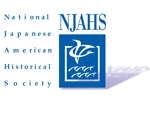
- This event has passed.
Virtual Broadcasts: Kayla Isomura of The Suitcase Project – In the Era of Covid-19
May 22, 2020 at 11:00 am - 12:00 pm
Click here to watch
SPECIAL ZOOM BROADCAST EVENT
Friday, May 22, at 6PM -7:00PM Pacific
Standard Time
An International Conversation with Yonsei Canadian curator /photographer Kayla Isomura of The Suitcase Project – In the Era of Covid-19. FREE.
Click here to REGISTER for the ZOOM Broadcast
The Suitcase Project, photographed by Kayla Isomura, made its debut in February 16, 2020 at the NJAHS Peace Gallery. With the onset of the Covid19 pandemic and mandatory shelter in place restrictions,,this exhibit takes on deeper universal meaning worldwide. Join us in conservation with curator, photographer Kayla Isomura and her subjects.
This exhibit and programming is made possible by a generous grant from the Henri & Tomoye Takahashi Charitable Foundation, the SF Grants for the Arts and matching support from the members of the Nat’l Japanese American Historical Society. While we are still sheltering in place, NJAHS makes the photographs in the current exhibit available on line and presents Kayla Isomura in a curator’s conversation about her work.



-More-
Past meets present in a new exhibit at the Nikkei National Museum & Cultural Centre, as more than 50 fourth and fifth generation Japanese Canadians and Americans share what they would pack if forcibly removed from their homes today.
Context of the Exhibit. Stemming from the history of Japanese Canadians and Americans during the Second World War, this multimedia exhibit highlights why this history is relevant more than 75 years later.
“What began as a photography project, capturing subjects in their homes, turned into conversations about contemporary issues, whether political or personal,” said Isomura, 25, who identifies as fourth generation Japanese Canadian. “In today’s landscape, Japanese Canadians and Americans don’t necessarily face the same degree of racism and discrimination as our ancestors. However, we remain affected by this history in many ways.”
“Struggling to understand and see ourselves is one aspect of that, as well as recognizing the ongoing displacement and discrimination other minority groups and people of color face today.”
In 1942, approximately 23,000 Japanese Canadians and more than 100,000 Japanese Americans living on the west coast were uprooted from their homes and placed in internment camps or incarceration.
Subjects for The Suitcase Project were given 24 to 48 hours notice to assemble their things, similar to what many Japanese Canadians faced in 1942.
“In the Canadian context, Japanese Canadians were not allowed to return home and their possessions were sold by the government or looted,” said Isomura. “If you were going to lose everything—your home, your business, your memories and personal possessions—what would you take outside of things for survival? Or would you focus on your practical needs?”
According to Isomura, Japanese Canadians were limited to weight restrictions while Japanese Americans were limited to only what they could carry.
“I never knew what my grandparents or great grandparents packed with them when they were interned, so I wondered what I could survive with sentimentally and how others would interpret this idea,” she said. “The original idea wasn’t just about what or how people would pack, but also what they are forced to leave behind.”
The Suitcase Project subjects range from infants to 51-year-olds, and they were photographed in the Lower Mainland, Vancouver Island and Western Washington.
Kayla hopes to collect more stories and subjects in the US. For more information about the exhibit project contact njahs@njahs.org
